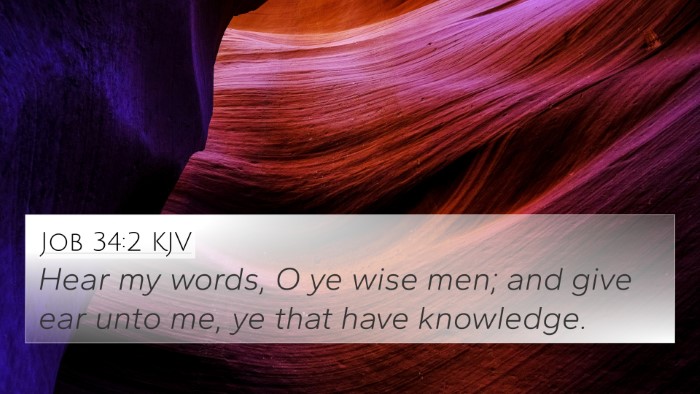Understanding Job 15:17
Job 15:17 states, "I will show you; listen to me; I too will tell what I have heard." In this verse, we see one character expressing a desire to communicate knowledge and experiences. This verse acts as an introduction to the teachings and perspectives that will follow. It emphasizes the themes of wisdom, understanding, and perception, which are pivotal in the book of Job.
Commentary Insights
This verse invites a dialogue of knowledge sharing, where the speaker intends to impart wisdom gained through personal experience. The following insights synthesize perspectives from various public domain commentaries:
-
Matthew Henry:
Henry emphasizes the value of shared experience and wisdom. He suggests that the speaker is urging the listener to consider profound truths that can lead to deeper understanding. This call to listen signifies the importance of receptivity in learning and growth.
-
Albert Barnes:
Barnes interprets this verse as an assertion of the speaker's authority in delivering wisdom. He notes that the phrase "I too will tell what I have heard" implies a continuity of learning and tradition, suggesting that life experiences impart lessons worth sharing.
-
Adam Clarke:
Clarke highlights the rhetorical nature of the speaker's intent. The use of "listen to me" indicates a persuasive effort to captivate the audience's attention. This introductory plea sets the stage for a more in-depth discussion on wisdom and folly that follows.
Thematic Connections to Other Scriptures
Job 15:17 resonates with several other biblical themes and verses, which underscore the interconnectedness of scriptural teachings:
- Proverbs 1:5: "Let the wise hear and increase in learning, and the one who understands obtain guidance." This verse parallels the theme of receiving wisdom and the importance of learning from others.
- James 1:19: "Know this, my beloved brothers: let every person be quick to hear, slow to speak, slow to anger." The emphasis on listening before responding is a vital lesson shared across these scriptures.
- Ecclesiastes 1:18: "For in much wisdom is much vexation, and he who increases knowledge increases sorrow." This suggests that the pursuit of wisdom often comes with challenges, a theme that may relate to the discussions to follow in Job.
- Proverbs 18:15: "An intelligent heart acquires knowledge, and the ear of the wise seeks knowledge." This verse similarly encourages the value of seeking out wise counsel.
- Isaiah 55:2: "Why do you spend your money for that which is not bread, and your labor for that which does not satisfy? Listen diligently to me, and eat what is good, and delight yourselves in rich food." This call to listen and consume what is beneficial mirrors Job's instruction to heed wisdom.
- 1 Corinthians 2:13: "And we impart this in words not taught by human wisdom but taught by the Spirit, interpreting spiritual truths to those who are spiritual." It emphasizes the divine source of wisdom shared among believers.
- Matthew 11:15: "He who has ears to hear, let him hear!" This phrase encapsulates the necessity of attentiveness in receiving wisdom.
- Psalms 66:16: "Come and hear, all you who fear God, and I will tell what he has done for my soul." Here, the act of sharing testimony about God’s work parallels the sharing of wisdom in Job.
- Proverbs 12:15: "The way of a fool is right in his own eyes, but a wise man listens to advice." This reinforces the need for humility in receiving counsel from others.
Connections between Bible Verses
Job 15:17 offers a significant opportunity to explore connections between various Bible verses. The act of sharing experiential wisdom aligns with broader biblical principles regarding wisdom, counsel, and learning from one another. Understanding these connections can enhance our comprehension of scriptural themes and promote holistic interpretations of the text.
Exploring Inter-Biblical Dialogue
Moreover, examining Job 15:17 within the larger context of inter-biblical dialogue enriches our understanding. By studying the links between both the Old and New Testaments, we can appreciate the continuity of biblical themes, such as wisdom and spiritual insight.
Tools for Bible Cross-Referencing
For those diving deeper into scripture study, utilizing tools for Bible cross-referencing can be invaluable. Such resources include:
- Bible Concordance: A comprehensive index of keywords that assist in finding related verses.
- Bible Cross-Reference Guide: This guide helps in finding pertinent connections between verses.
- Cross-Reference Bible Study: Engaging in rigorous study methods to explore links and themes.
- Bible Chain References: A method that shows sequential links between several passages across scripture.
- Cumulative Bible Cross-Reference Materials: Ensuring access to extensive studies for broader contexts.
Conclusion
In conclusion, Job 15:17 serves as a profound invitation to engage in the mutual sharing of insights gained from experience. It highlights the significance of listening, learning, and imparting wisdom, which is vital across the tapestry of scripture. This verse, along with its connections to other biblical texts, illustrates the rich and interconnected nature of the biblical narrative, providing a deep reservoir from which believers can draw practical and spiritual insights.







